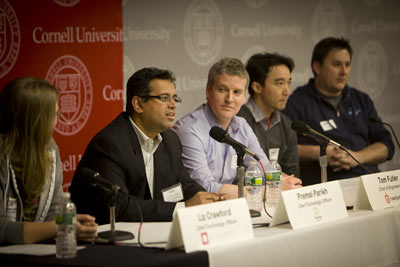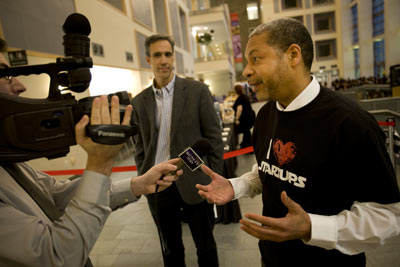Panelists advise students on working for tech startups
By Farhan Nuruzzaman

New York City brings together a wide variety of creative talent that's highly conducive to innovation and entrepreneurship, according to founders and chief technical officers (CTOs) of several startup businesses. They spoke at the NYC Tech Talent Draft, a career panel discussion for Cornell students Feb. 1 in Phillips Hall.
"One of the great things about New York for our company is the amazing variety of talent you find there," said Liz Crawford, CTO at Birchbox, a beauty and lifestyle product firm. "Birchbox has an entire content team that produces a monthly magazine, and the people we employ for this often used to work for companies like Marie Claire. So there's a lot of very creative talent in New York, and that's something we really leverage as a company."
The panelists discussed the pros and cons of working at a startup compared with a larger company.

"It depends on the person, frankly. I don't think everyone is ready to work at a startup as a first job. Some people want the structure [of an established company], they want to know what their growth path is, they don't want the ambiguity associated with being in a startup," said Premal Parikh, CTO at Everyday Health, which offers personalized health tools and news.
However, Parikh noted that working for a startup gives workers the opportunity to create wealth at a much faster rate than would be possible at a larger company -- and the potential to make an enormous impact.
"When you're starting out, expect to spend 10 years becoming the next you," said Tom Fuller, chief of engineering at Next Jump, an e-commerce company that handles loyalty programs for merchants. "That's why startups are awesome, because you have so much thrown at you, you have so much responsibility, you take it and you make what you want of it, which just doesn't happen at a larger corporation."
The panelists also noted the kinds of skills they look for when hiring engineers and software developers.
"We don't hire for any particular technology, as a way to broaden the pool and bring in the best software engineers," said Josh Knowles, managing director of Pivotal Labs, which develops Web and mobile applications. Knowles noted that pure aptitude and solid engineering skills are key, as is a basic understanding of how the Web works and how mobile applications work.
"We love hackers and people who are actually doing stuff," said Danny Wen '00, who studied computer science at Cornell before co-founding Harvest, a company that develops time tracking software for businesses. "If they're taking time outside of academic work to work on a side project or a passion project that they have, then that's a really strong indicator that they'll be a great person to work with, because they know how to get things done and actually produce something cool."
This panel discussion was sponsored by the New York City Economic Development Corp. and was part of the inaugural Cornell Startup Career Fair, which featured more than 40 startups and was heavily attended by students. The Cornell Startup Career Fair was sponsored by Entrepreneurship@Cornell and the Kessler Fellows Program.
Farhan Nuruzzaman '12 is a writer intern for the Cornell Chronicle.
Media Contact
Get Cornell news delivered right to your inbox.
Subscribe